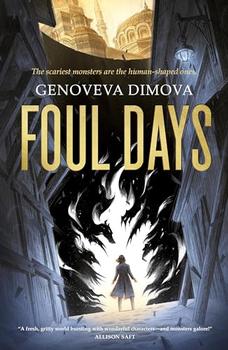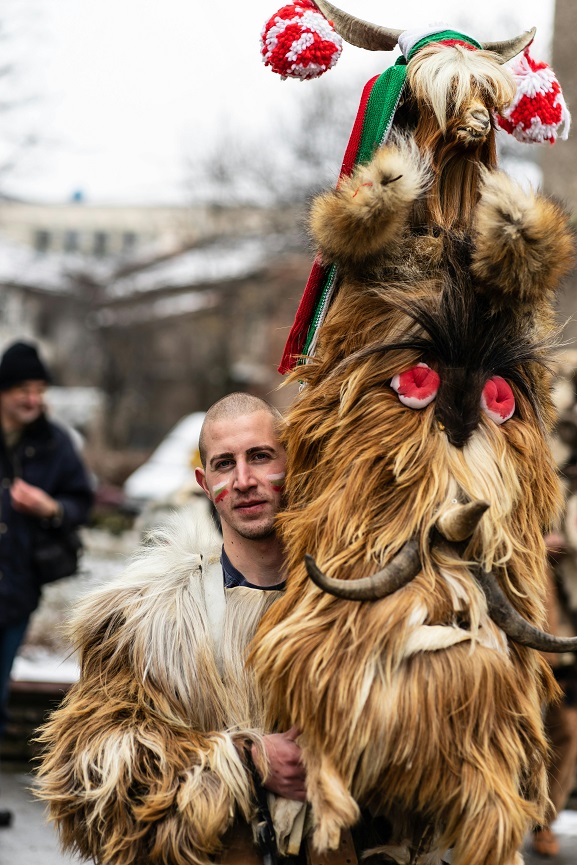Summary | Excerpt | Reviews | Beyond the Book | Read-Alikes | Genres & Themes | Author Bio

The Witch's Compendium of Monsters #1
by Genoveva DimovaThis article relates to Foul Days
 Genoveva Dimova's debut novel, Foul Days, takes place over a twelve-day period known in Bulgarian culture as the "Unclean Days," "Dirty Days" – or, indeed, "Foul Days." In the first chapter, in a pub on a dark, wintry New Year's Eve, one of the characters explains: "The Foul Days have begun. The New Year was born, but it hasn't been baptised yet. The monsters roam the streets freely. … They are only allowed to come here during the Foul Days, when the boundary between our world and theirs is hair-thin."
Genoveva Dimova's debut novel, Foul Days, takes place over a twelve-day period known in Bulgarian culture as the "Unclean Days," "Dirty Days" – or, indeed, "Foul Days." In the first chapter, in a pub on a dark, wintry New Year's Eve, one of the characters explains: "The Foul Days have begun. The New Year was born, but it hasn't been baptised yet. The monsters roam the streets freely. … They are only allowed to come here during the Foul Days, when the boundary between our world and theirs is hair-thin."
In Bulgarian folklore, the Foul Days occur over the twelve days between Christmas Day (25th December) and St. Yordan's Day, also known as Epiphany (6th January). During this period of transition from the old year to the new, it is believed that monstrous beings can cross over into the mortal world, bringing with them great danger, darkness, and chaos. Among these monsters are creatures of Slavic legend, such as karakonjuls, similar to the half-human, half-horse centaurs of Ancient Greek legend, but far more violent and vicious. Other creatures that roam the earth during the Foul Days are upirs, similar to vampires or zombies; varkolaks, undead creatures that are a cross between werewolves and vampires; house spirits known as kikimoras; rusalkas, akin to sirens or malevolent mermaids; samodivas, wood nymphs associated with illnesses and whirlwinds; as well as the more familiar vampires, witches, goblins, and ghouls.
Another monster that emerges, and that serves as the main villain in Dimova's book, is the Zmey or Zmei, a dragon or serpent that can shapeshift into a handsome young man. There is also the Thalassa; the etymology of the name is the ancient Greek word for "sea" and the female divinity associated with it. However, the Thalassa in Bulgarian folklore is a shadow that is separated from its owner and embedded in a bridge or a fountain as it is being constructed. This practice is thought to ensure that the structure would remain stable. A person's shadow has to be taken at noon and hidden from them until it can be embedded; but because their shadow is an essence of their being, the person will die soon after it has been taken. This folktale concept of the Thalassa seems to have inspired one of the driving forces of the plot in Foul Days, as well as an integral part of its "embedding magic" denouement.
There are all kinds of beliefs and superstitions associated with the Foul Days, many of which are meant to protect people from the "unclean" demonic forces at large in the world. It is suggested that couples should not get engaged or married during this period, and in fact any ceremony or large gathering is to be avoided. People are discouraged from leaving the house at night. Cloves of garlic are sewn into clothing for protection. Some may refrain from bathing because the Great Blessing of the Water on Epiphany has not yet taken place.
Despite the dangers of the Foul Days, in villages across Bulgaria, masquerade games are held during the day, in which people dress up in frightening masks and apparel, a custom reminiscent of Halloween. These costumes are believed to help chase away evil spirits and the winter darkness. The Foul Days officially end with the first crowing of the cockerel on St. Yordan's Day, or Epiphany. In the Roman Catholic Church, Epiphany is the day on which the Three Kings brought their gifts to the baby Jesus. However, in the Bulgarian Orthodox Church, Epiphany is also called Yordanoven or St. Yordan's Day, and is the day on which Jesus was baptized by John the Baptist in the River Jordan. The Great Blessing of the Water on 6th January purifies the world.
The Surva Festival in Pernik during the Foul Days, photograph by Kiril Gruev, courtesy of Pexels
Filed under Cultural Curiosities
![]() This article relates to Foul Days.
It first ran in the July 17, 2024
issue of BookBrowse Recommends.
This article relates to Foul Days.
It first ran in the July 17, 2024
issue of BookBrowse Recommends.
Your guide toexceptional books
BookBrowse seeks out and recommends the best in contemporary fiction and nonfiction—books that not only engage and entertain but also deepen our understanding of ourselves and the world around us.